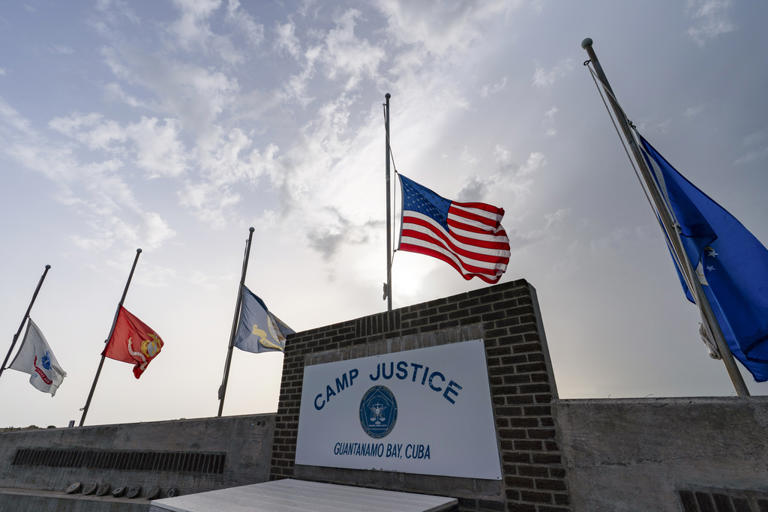“Guantanamo Prisoners Face Turning Point as 9/11 Case Heats Up What You Need to Know”
After 23 years, the fate of Guantanamo’s last detainees is reaching a critical juncture. This month, court battles and negotiations are determining the future of the remaining men at the U.S. naval base in Cuba, including those charged with orchestrating some of the 21st century’s deadliest attacks.
The Biden administration is racing to resolve as many cases as possible before Donald Trump, who opposed closing Guantanamo during his first term, potentially retakes office on January 20. Trump’s pick for defense secretary has also voiced support for keeping the prison open.
In the most prominent case, the administration is attempting to block a plea deal for Khalid Sheikh Mohammed, the alleged mastermind of the 9/11 attacks, and two co-defendants. The proposed agreement, which would spare them the death penalty, was initially negotiated by the Defense Department but later rejected.
At its height, Guantanamo housed nearly 800 Muslim men captured worldwide during the George W. Bush administration’s “war on terror.” Many were tortured in CIA custody, complicating legal proceedings and tarnishing the U.S.’s global reputation. Most detainees were held without charge or trial, according to Human Rights Watch.
Now, as the prison nears its third decade, the push to resolve these cases marks a pivotal chapter in its controversial history.
How Guantanamo Became a Hub for Detainees
In January 2002, the Bush administration decided to detain foreigners captured overseas at Guantanamo Bay, Cuba, in response to the 9/11 attacks that upended the U.S. and global order. Nineteen al-Qaida hijackers orchestrated the devastating strikes on the World Trade Center, the Pentagon, and a Pennsylvania field, prompting U.S. military operations in Afghanistan, Iraq, and beyond. Seeking a location outside U.S. soil to imprison and judge detainees, the government turned to its century-old naval lease on Guantanamo, citing World War II-era military commission laws.
However, many of the detainees were later shown to have no connection to extremist groups. Vice President Dick Cheney defended the decision, calling the prisoners “the worst of the worst.” Cheney argued the alternatives were to try them in U.S. courts, granting them constitutional rights, or eliminate them outright. A 2008 Supreme Court ruling, however, mandated that Guantanamo detainees’ treatment must align with the U.S. Constitution.
Why Guantanamo Matters
While U.S. military actions significantly reduced the capabilities of groups like al-Qaida and ISIS, they left a complex legacy. The wars inflicted massive human and financial costs, including detainees’ early years of torture and prolonged imprisonment without trial. Legal experts often call the detainees’ torture the “original sin” of Guantanamo prosecutions, casting doubt on the legitimacy of any trials.
Rights groups estimate Guantanamo costs over $540 million annually—$36 million per detainee, with only 15 prisoners remaining. The ongoing detentions highlight unresolved issues of justice, human rights, and the financial toll of U.S. counterterrorism efforts.
U.S.-Taliban Negotiations
The Biden administration is also negotiating with the Taliban to secure the release of three Americans believed to be held in Afghanistan since 2022: Ryan Corbett, a businessman abducted while traveling; George Glezmann, an airline mechanic detained by Taliban intelligence; and Mahmood Shah Habibi, an Afghan American contractor.
Talks reportedly include the potential release of an Afghan national held at Guantanamo for years, a figure central to the Senate Intelligence Committee’s report on CIA torture. Sources indicate the Taliban may also demand the release of additional individuals in U.S. custody as part of any agreement.
Whether a deal can be finalized before the Biden administration ends remains uncertain. The negotiations underscore the ongoing challenges of resolving Guantanamo’s complex and controversial legacy.
Biden’s Efforts to Transfer Guantanamo Detainees
Since taking office, President Joe Biden has reduced the Guantanamo population from 40 to 15, with an extraordinary push in his final weeks. This includes transferring 11 Yemeni men, held for over two decades without charges, to Oman. However, finding host countries willing to accept detainees while ensuring they won’t face abuse or extremist recruitment remains a challenge.
One notable case involves Nashwan al-Tamir, a disabled Iraqi prisoner who pleaded guilty in 2022 to war crimes linked to al-Qaida. He is fighting U.S. plans to transfer him to Iraq, where he fears mistreatment and inadequate medical care. Six of the remaining detainees, never charged, are the focus of rights groups pushing for their release before Biden leaves office.
High-Profile Defendants and the 9/11 Case
Seven detainees face charges, including Khalid Sheikh Mohammed and four others accused in the 9/11 attacks that killed nearly 3,000 people. Others are charged in the 2002 Bali bombing and the 2000 USS Cole attack.
Military prosecutors have sought plea deals, including one where Mohammed and two co-defendants would plead guilty to 2,976 murder charges in exchange for life sentences. The deals would also provide answers to victims’ families and prevent future death penalty pursuits if the defendants complied with the terms.
However, Defense Secretary Lloyd Austin opposes the agreements, arguing death penalty decisions in cases like 9/11 should rest solely with him. Despite Biden’s administration appealing to block the deal, Mohammed’s guilty plea is expected Friday, with families of 9/11 victims attending.
Potential Shifts Under Trump
Uncertainty looms over how Donald Trump would handle Guantanamo if he returns to office. During his first term, Trump signed an executive order to keep the facility open, reversing Barack Obama’s unfulfilled pledge to close it.
Republican lawmakers, outraged by the plea deals, plan to introduce legislation mandating death-penalty trials for 9/11 defendants and requiring their permanent solitary confinement. Trump’s pick for defense secretary, Pete Hegseth, has criticized the slow pace of military commissions, calling it a weak message to extremists.
As Biden’s term ends, the future of Guantanamo and its detainees remains fraught with legal, political, and humanitarian complexities.
